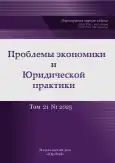The Role of Constitutional and Legal Regulation of Budgetary Relations in the Context of Digitalization
- Autores: Petrova G.V.1,2, Stupakov V.I.2
-
Afiliações:
- Russian University of Transport
- Griboedov Moscow University
- Edição: Volume 21, Nº 1 (2025)
- Páginas: 67-72
- Seção: Public Law (State and Legal Sciences)
- URL: https://bakhtiniada.ru/2541-8025/article/view/289143
- DOI: https://doi.org/10.33693/2541-8025-2025-21-1-67-72
- EDN: https://elibrary.ru/ULBPKS
- ID: 289143
Citar
Resumo
Introduction. The article examines the constitutional foundations of budget regulation and the budget process, which are developing in connection with the expansion of legislative regulation of the digitalization of budgetary relations. The information and legal regulation of budgetary relations in the context of digitalization of budgeting and budgetary control over the effectiveness of government agencies and institutions managing budget funds is analyzed. The relationship between the processes of constitutional and legal development and public-legal regulation of planned and budget financing of state needs in the context of digitalization of public finances is shown. Materials and methods. The article uses regulatory legal acts, analytical materials, forecasts of the Government of Russia, the Ministry of Finance of Russia, the Federal Treasury on the creation and functioning of state integrated information systems (subsystems, their components, modules) for managing state public finances. The methods of theoretical and comparative legal analysis of the positions of scientists regarding the relationship between legal and non-legal regulators of digitalization of budgeting, the budget process, legal concepts of information, budgetary, digital legislation. Results. Constitutional and legal regulation of budgetary relations in the context of digitalization shows the widespread use of constitutional and legal means to ensure information security of budgets, protect budgetary security, and ensure the effectiveness of budgetary control in the field of public procurement and project financing. It should be noted that, according to the provisions of the Constitution of the Russian Federation, the information activities of the state are associated with the digital modernization of public finance management with the unity of the public authority and the budget system. Discussions and conclusions. It is noted that the digitalization of budgetary funds management is carried out under state programs for the digitalization of economic sectors with the participation of government bodies, state corporations, and public-law companies. A special role is given to digital financial and budgetary platforms that carry out transactions with public finances with treasury support, as integrated information and communication systems that ensure the exchange, analysis, and selection of information by all participants in the budget process.
Texto integral
##article.viewOnOriginalSite##Sobre autores
Galina Petrova
Russian University of Transport; Griboedov Moscow University
Autor responsável pela correspondência
Email: galina.v.petrova@mail.ru
Código SPIN: 2700-7493
Dr. Sci. (Law), Professor of the Department of Transport Law of the Law Institute; Professor of the Department of Civil Law of the Faculty of Law
Rússia, Moscow; MoscowValeriy Stupakov
Griboedov Moscow University
Email: s.stupakov@mail.ru
Cand. Sci. (Law), Associate Professor, Head of the Department of Constitutional and Administrative Law
Rússia, MoscowBibliografia
- Andreev V.K. Legal regulation of the use of digital technologies in civil circulation // Legal informatics. No. 3. 2022. P. 13–22.
- Actual problems of financial law in the context of digitalization of the economy. Monograph: Gracheva E.Yu., Arzumanova L.L., Artemov N.M. M: Prospect. 2023. 256 p.
- Artemova S.T., Zhiltsov N.A., Cherdakov O.I. Digital divide and constitutional guarantees of digital equality // Constitutional and municipal law. 2020. No. 10. P. 41–45.
- Gabov A.V. Digital platform as a new legal phenomenon // Collection of articles following the results of the Fourth international scientific and practical conference «Bachilov Readings» (Moscow, Institute of State and Law of the Russian Academy of Sciences, February 5, 2021). P. 13–80.
- Ensuring the rule of law in the digital economy: a textbook for universities / edited by N. D. But, Yu. A. Tikhomirov. 2nd ed., revised. and additional. Moscow: Yurait, 2025. 257 p.
- Omelyokhina N.V. Digitalization of the budgetary sphere as an object of legal impact // Journal of Russian Law. No. 6. 2020. P. 128–140.
- Povetkina N.A., Artyukhin N.E. New institutions of budget law in the context of the digital revolution. Monograph. M. Norma. 2023. P. 192.
- Polyakova T.A. Development of constitutional and legal foundations for ensuring information security as a component of national security / Rule of law: theory and practice. Research project of the Russian Foundation for Basic Research 18-29-16013 «Study of conceptual approaches to the formation of a system of legal regulation of information security in the context of major challenges in the global information society». 2020. P. 54–62. doi: 10.33184/pravgos-2020.4.6.
- Postnikov A.E. Constitutional model of the political system of Russia in the context of the development of the «digital society» // Journal of Russian Law. No. 5. 2020. P. 38–49.
- Tereshchenko L.K. Registry model of the provision of state and municipal services // Journal of Russian Law. 2021. Vol. 25. No. 7. P. 110–120. DOI: 10.12737/ jrl.2021.09.
Arquivos suplementares








